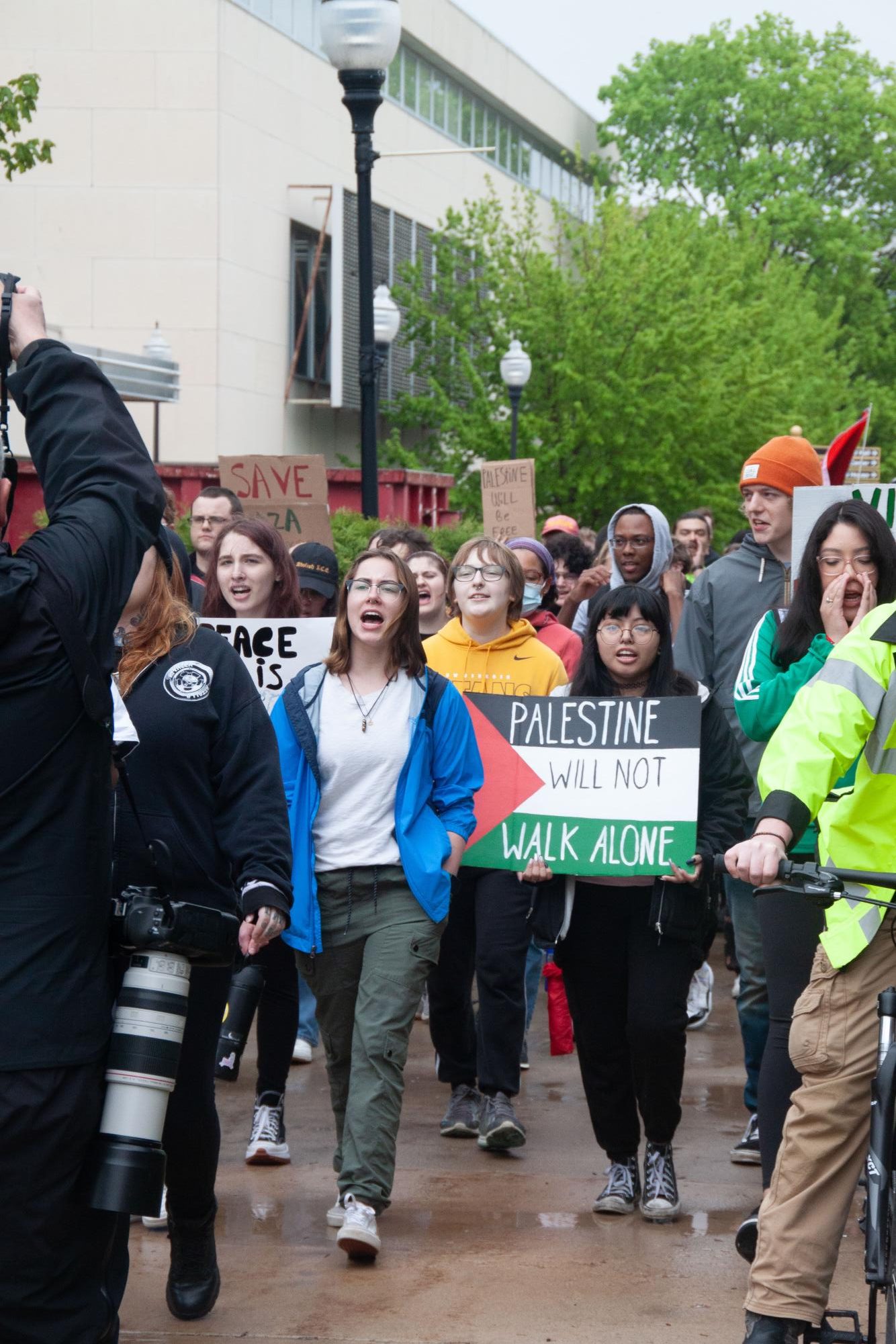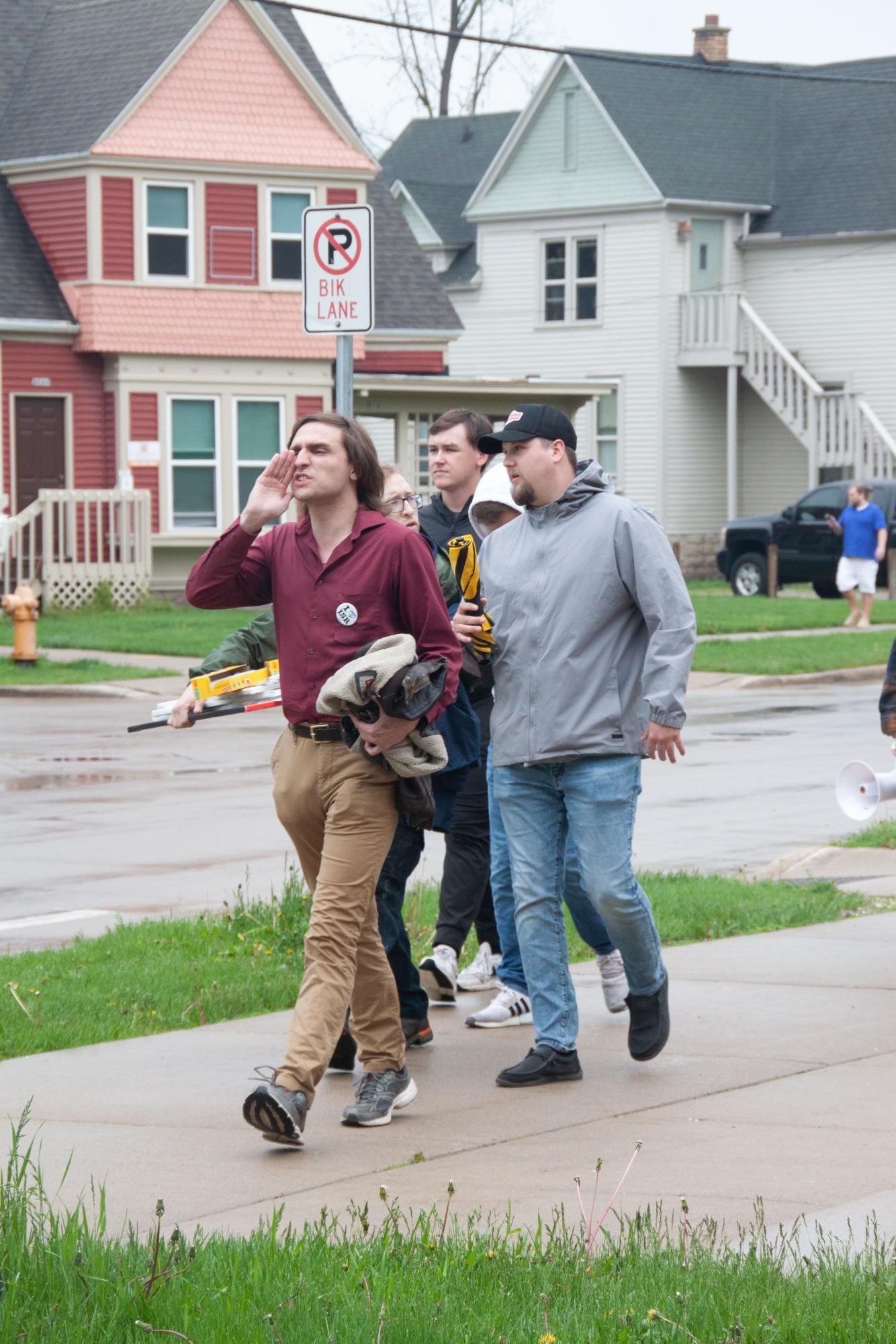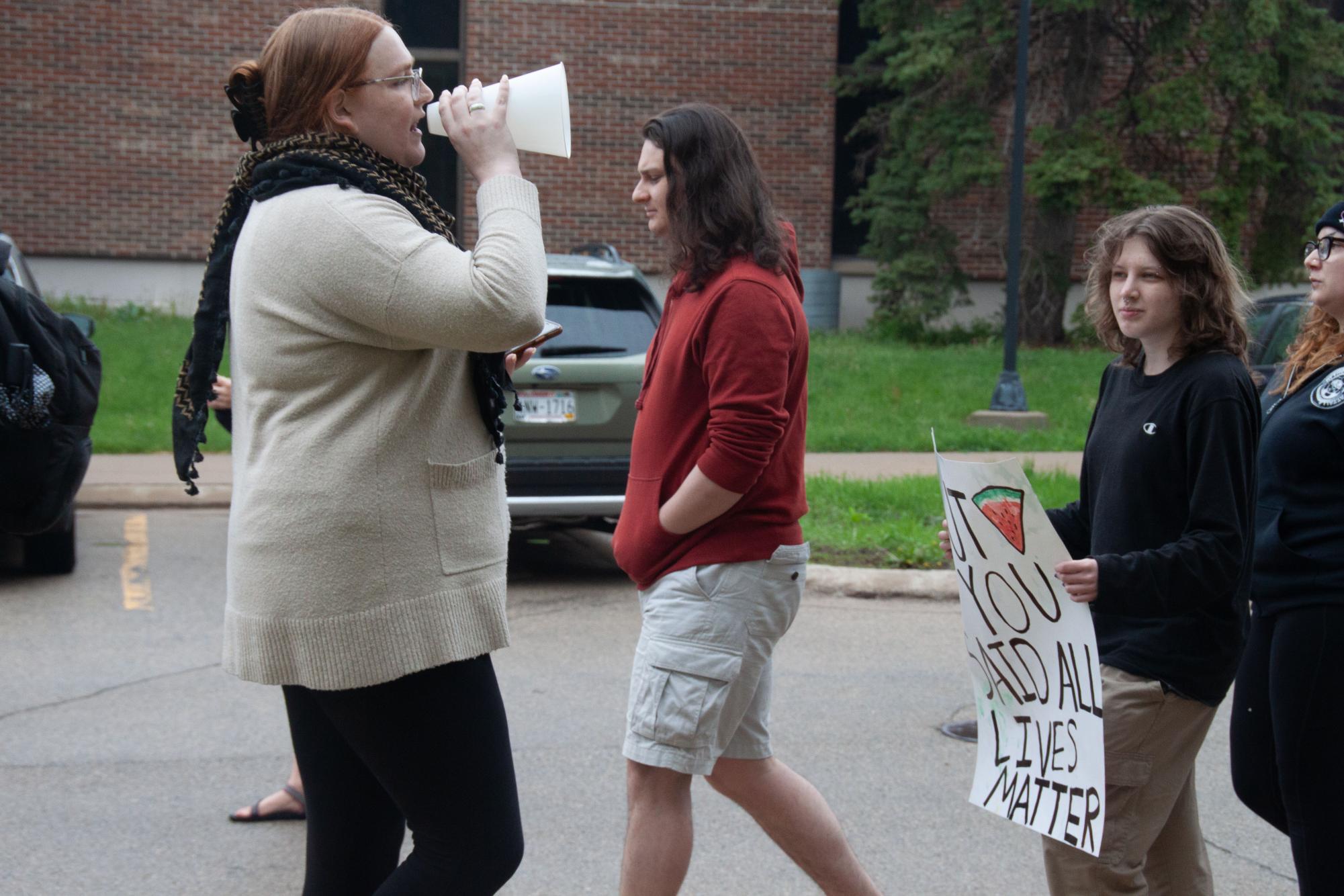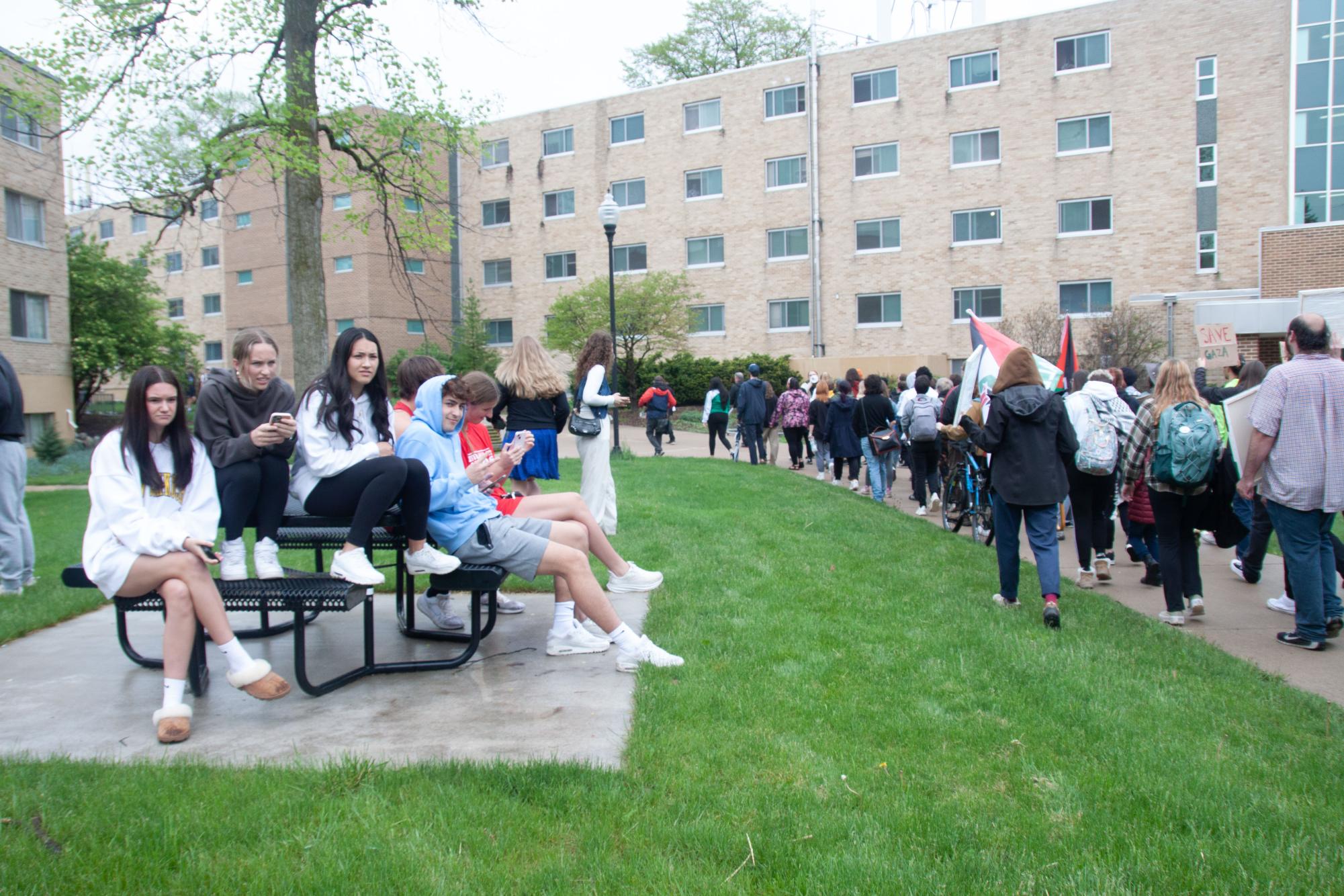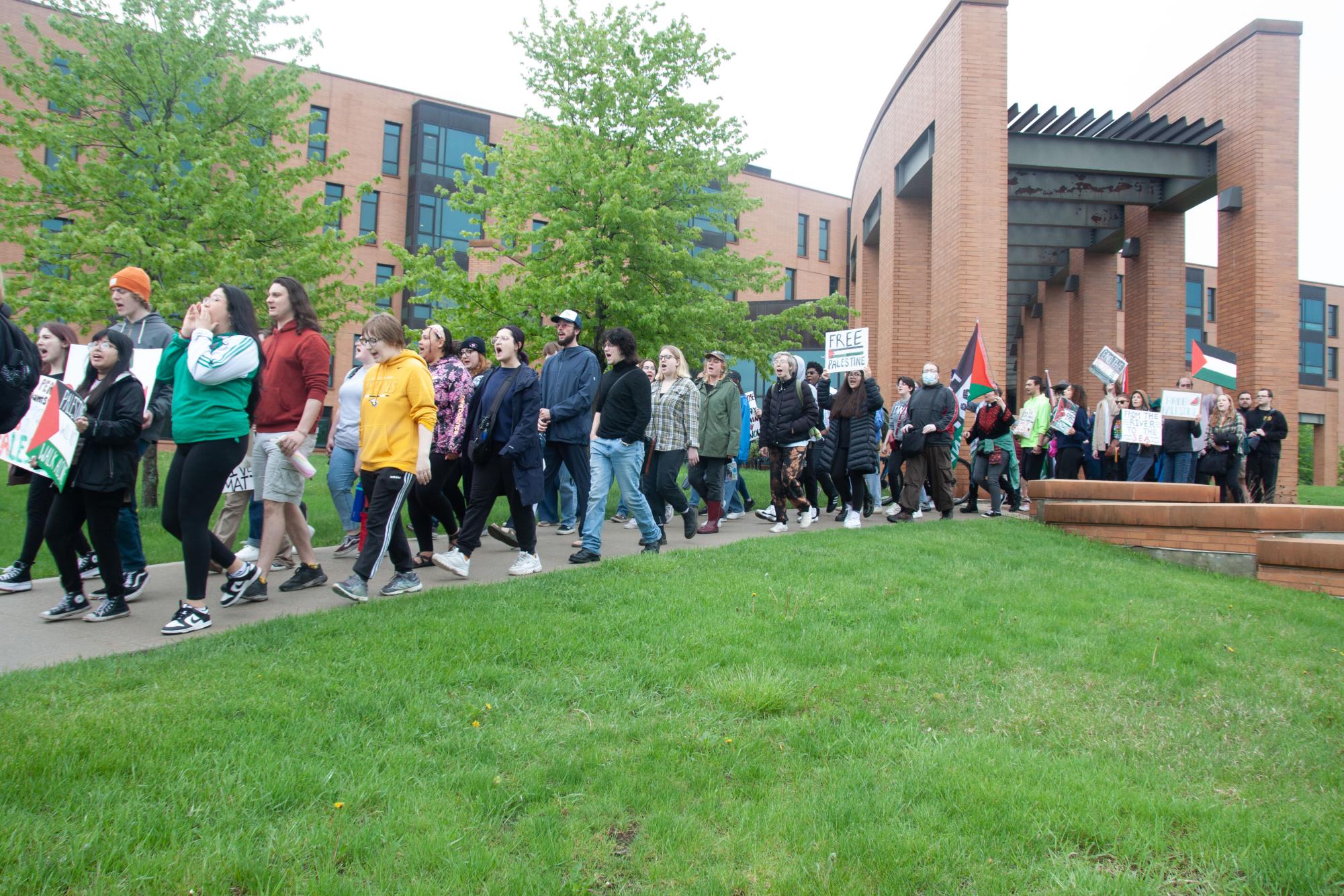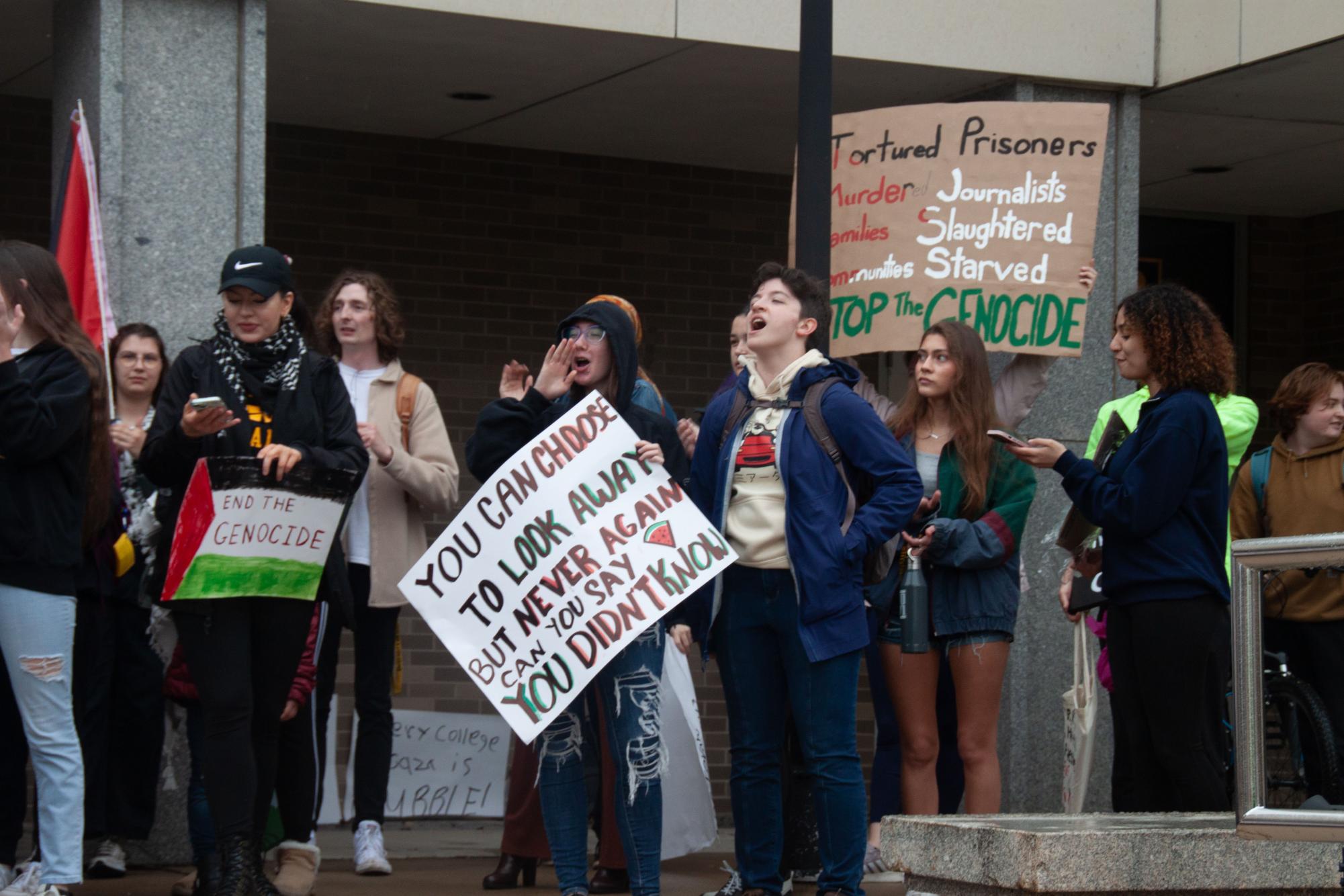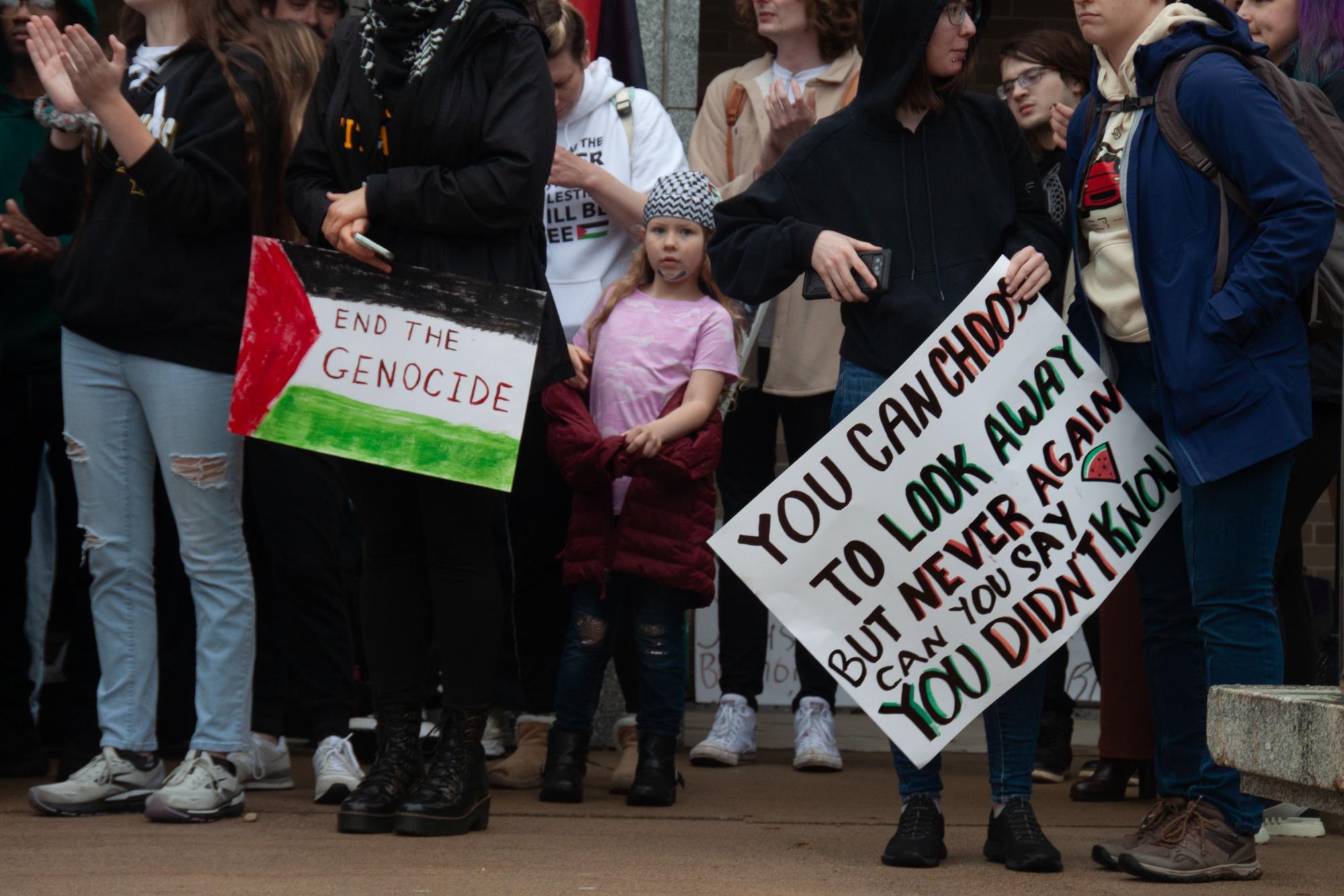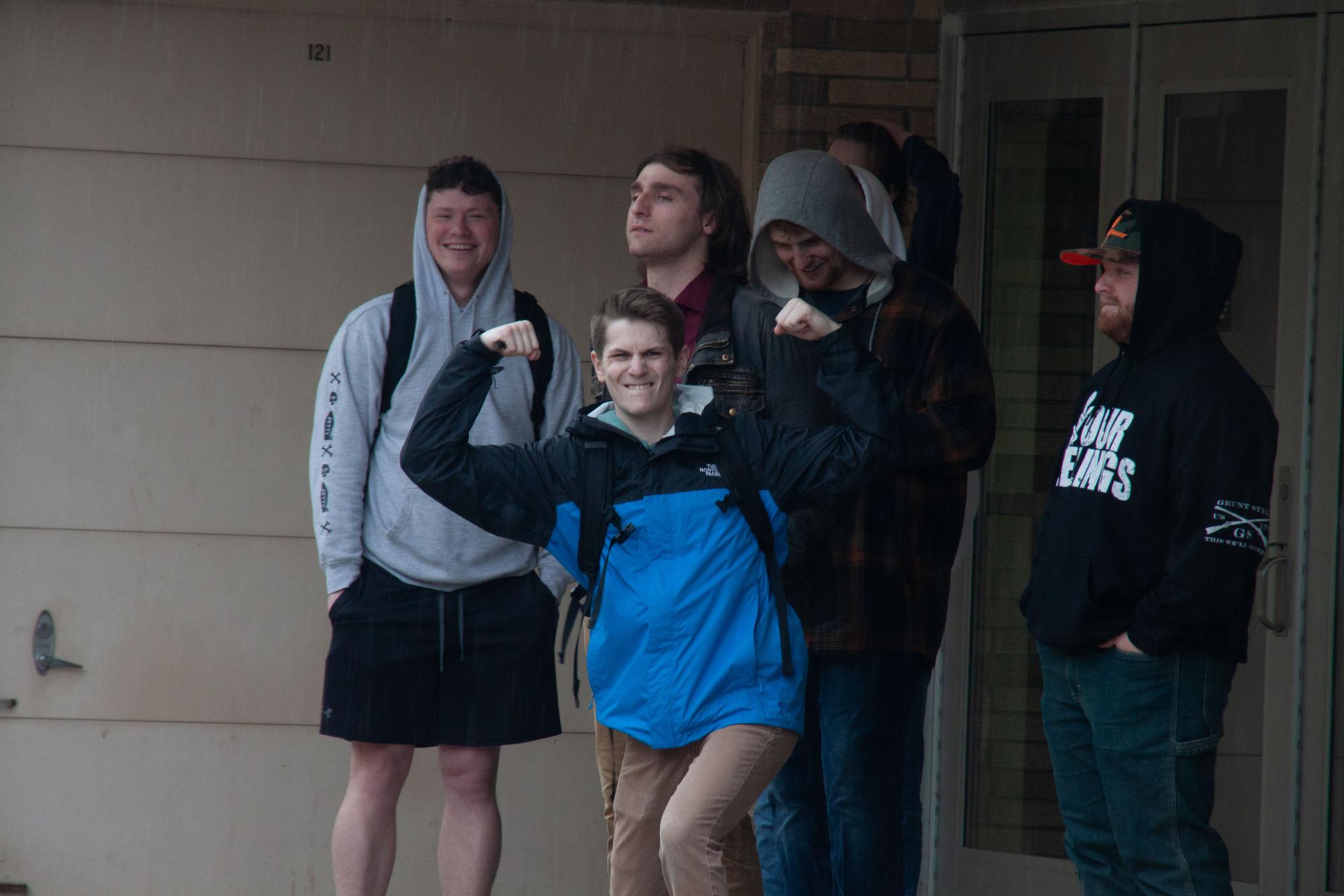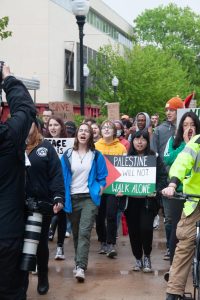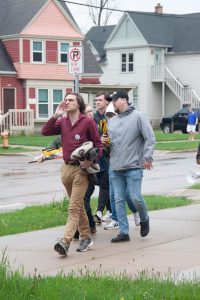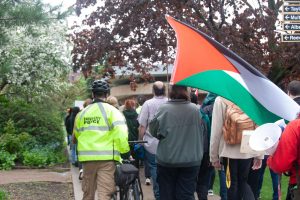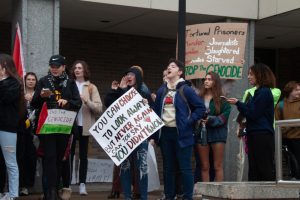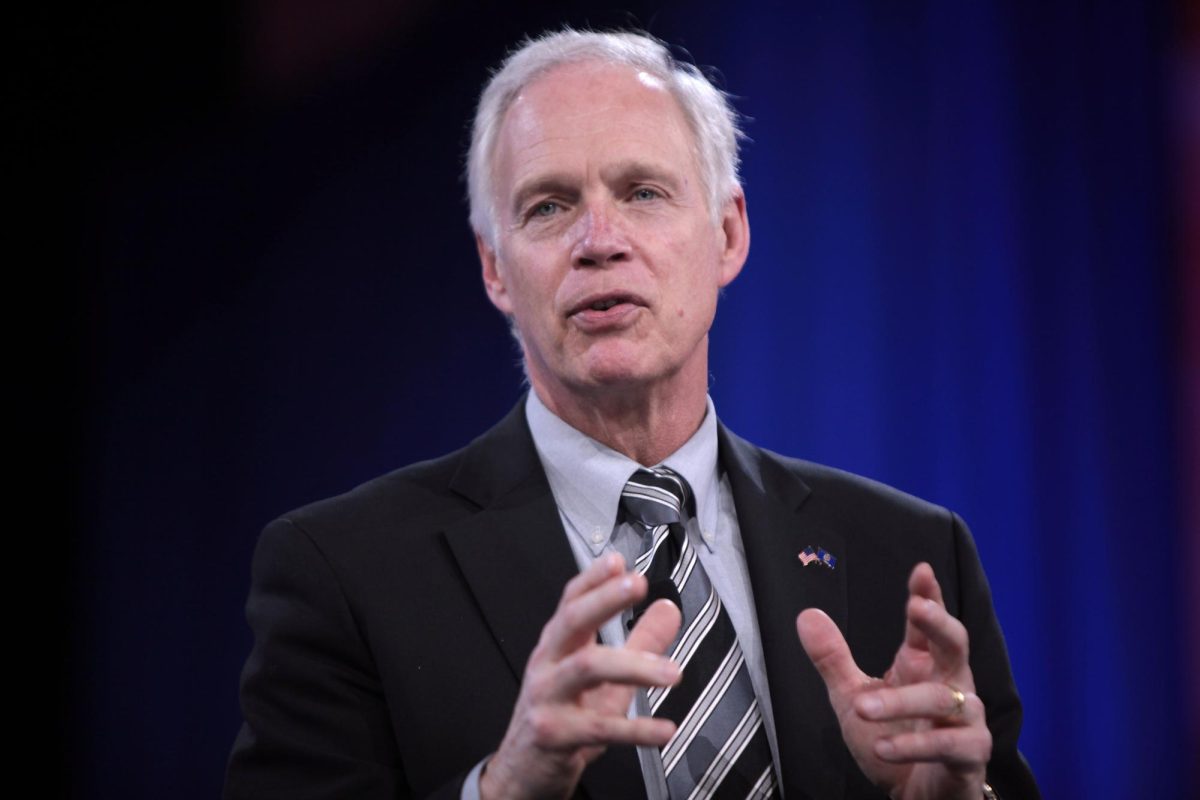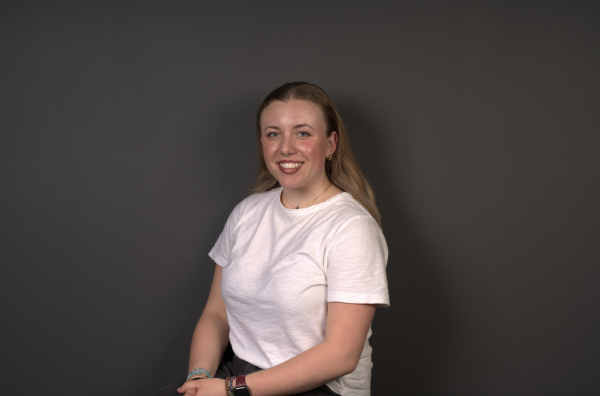One week after the Palestine encampments began at UW-Madison and UW-Milwaukee, UW Oshkosh had a march of its own.
Today, despite impending rain and humidity, protesters from the campus and surrounding community gathered in front of Polk Library to demand a free Palestine.
After a short opening statement from Sarah Osterbrink, the president of the Oshkosh Student Socialist Association, approximately 50 pro-Palestinian protesters marched around campus chanting “Palestine is our fight, students of the world unite,” and “from Oshkosh to Palestine, occupation is a crime.”
Aspyn Rafac, a political science major at UWO, has family in the Chumash tribe on the Santa Ynez reservation in southern California. Rafac spoke on the genocide of the Palestinian people at the end of the march, drawing parallels on her tribes history with genocide.
“In 1846, my tribe experienced its own genocide, also known as the California genocide,” Rafac said.
Rafac said that when her people revolted they were called “savages and wild redskins.”
“They used that to justify their taking of our land, rape of our women and children, slaughter of our men and sterilization of our people,” Rafac said. “As an Indigenous American, I have seen too many parallels between Indigenous experiences and those of the Palestinian Indigenous people.”
Instead of savages, innocent Palestinian’s are being called terrorists, Rafac said.
“Any person with humanity knows that no child deserves to die at the hands of violence for any reason, especially not for reasons far out of their control,” Rafac said.
Rafac reminded the crowd that this is not a religious protest, but a protest against the actions taken by the Israeli government, U.S. government and those “complacent and continuing to escalate the numbers of civilian lives taken in Gaza.”
“As an American citizen, I was raised being told that it is the foundation of American liberty to be able to call out a corrupt government when it is no longer serving its people,” Rafac said. “And with my voice, I demand that the UW System detach itself from PepsiCo, Oshkosh Corporation and other companies that are directly funding the Israeli military and are paying for the death of innocent men, women and children in Palestine with our blood money.”
Last January, Oshkosh Corporation announced they would be producing hundreds of armored personnel carriers for the Israeli military. In December, the industrial company said they received orders for at least 75 joint tight tactical vehicles from the Israeli Ministry of Defense.
PepsiCo has faced backlash after purchasing SodaStream, which has faced global boycotts due to reported discrimination against Palestinian employees and displacing Indigenous Bedoin-Palestinian citizens in present-day Israel.
Rafac called on Chancellor Andrew Leavitt to listen to student voices and involve students in the choices being made on their behalf.
Shortly after the march concluded, Leavitt released a statement regarding the march.
“Today, the Oshkosh campus was once again stage for the demonstration of free expression, legal protest and a shared commitment to public safety,” Leavitt said. “People exercised their First Amendment rights, and teaching, learning and service continued according to our mission.”
Neenah native Rosemary McCarthy brought her daughter River to participate in the march.
“I didn’t learn about Palestine until I was 42,” McCarthy said. “So I’m making sure that my daughter learns about the human rights in this world well before I learned about it.”
This is the McCarthy’s fourth march after visiting the Madison and Milwaukee encampments.
River, too shy to speak, had her mom tell the story of how she got the keffiyeh, a traditional Palestinian scarf, she was wearing on her head.
After visiting UWM’s encampment, River and her mom stopped by Aladdin, a Middle Eastern restaurant located in the Milwaukee Public Market. The owner came out to thank River and her mom for supporting Palestine, giving River the keffiyeh she donned at the UWO march.
McCarthy recalls a moment when they felt unsafe after they left the encampment.
“Unfortunately, when we went to the Milwaukee Public Market, someone saw us wearing keffiyehs and decided to call [me] a moron,” McCarthy said. “But then a nice young lady saw what happened and gave us a rose and said she appreciated it.”
UWO’s march received minor backlash from a group of male students who followed the protesters through campus chanting “USA, USA” and asking why the group was calling for death to the Israeli people.
A group of students sitting outside of Taylor Hall said they were unaware the demonstration would take place. When asked about their initial reaction to the protest, one student responded: “I don’t know. Seems kind of stupid to me.”

The major backlash came online.
On the anonymous posting app YikYak, students across campus posted about the march laughing at protesters and calling them names.
One post said, “hey!! Protesters no one here likes you.” followed by a smile emoji. Another said “would be unfortunate if a strike of lightning hit the protest.”
A Loyola University student who preferred to remain anonymous was visiting a friend in Oshkosh when they heard about the campus march. She said it was important for her to join the movement any time the opportunity presents itself, so she and a small group of friends attended the protest.
“The Palestinians’ movement is not really something that you can just choose to join in on,” she said. “It’s something that really takes precedence and has so many involvements your whole life.”
Shahnaz Hassan, also a Loyola student who traveled from Chicago to visit the same friend, said raising awareness about the Israeli-Palestinian conflict among students is crucial to see change.
“I think that throughout history, if you look, all change starts in college campuses,” she said. “So, we do have all the power, especially. We’re supposed to be a democracy, so the power starts with people, and since the U.S. is funding so much into the genocide that is happening in Palestine, we need to start this movement.”
The other Loyola student echoed this sentiment. She said students should familiarize themselves with social issues.
“Youth is the future, and if people aren’t realizing it now, it’s harder for them to realize later,” she said. “Even if they’re not comfortable being part of movements yet, even just educating themselves and taking that first step [is beneficial].”
After the march, Niveen Sarras, a Palestinian-born pastor at St. Mark’s Lutheran Church in Neenah, shared how the Israeli-Palestinian conflict has personally affected her. Last year, five of Sarras’s family members, along with hundreds of other displaced civilians, were sheltering in Gaza’s Church of Saint Porphyrius.
In October 2023, an Israel airstrike killed at least 16 people, according to the New York Times. Five of these fatalities were Sarras’s family.
“They were sheltering there,” Sarras said. “They thought they would be safe. Children, women, elderly died.”
Sarras expressed gratitude toward protesters for their support for her, her family and other Palestinians.
“I thank you for the demonstration, and I encourage you to keep doing this peacefully and to not pay attention to those who try to stop you from doing what is right and just,” she said.


